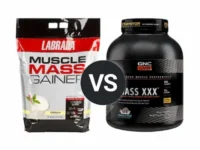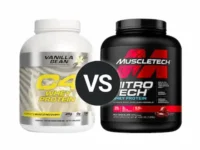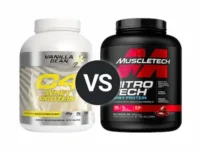Knowledge BaseYou're Questions Answered
What is whey hydrolysate?
Whey hydrolysate, also known as hydrolyzed whey protein, is a form of whey protein that has undergone enzymatic hydrolysis—a process that breaks down the protein into smaller peptides and amino acids. This pre-digestion process makes whey hydrolysate the fastest absorbing form of protein available, offering distinct advantages when timing protein intake after a rigorous workout.
However, the additional processing of whey isolate into a hydrolysate usually comes at a considerably increased cost that may make it less cost-efficient for most users.
Characteristics of Whey Hydrolysate
- Rapid Absorption: Due to the hydrolysis process, whey hydrolysate is absorbed more rapidly by the body than a whey concentrate or isolate. This rapid absorption is beneficial for more immediate muscle recovery post-exercise1.
- Reduced Allergen Content: The hydrolysis process also reduces the allergenic properties of whey proteins, making whey hydrolysate a possible option for those who are mildly allergic to dairy products2.
- Enhanced Digestibility: By breaking down the protein into smaller components, whey hydrolysate is easier to digest, which can be advantageous for individuals with sensitive stomachs, lactose intolerance, or those who experience digestive discomfort from other forms of whey protein3.
Benefits of Whey Hydrolysate
- Optimal Muscle Repair: The quick absorption of amino acids from whey hydrolysate makes it ideal for post-workout recovery, helping to rapidly initiate the repair and rebuilding of muscle fibers damaged during intense exercise4.
- Supports Greater Muscle Growth: The availability of amino acids soon after consumption can potentially lead to greater rates of muscle protein synthesis, an important factor for muscle growth and recovery5.
- May Enhance Metabolic Rate: The faster digestion and absorption of whey hydrolysate may contribute to a higher thermic effect of food, the amount of energy expenditure above the resting metabolic rate, which can help in managing body weight6.
Whey hydrolysate is particularly suited for athletes and fitness enthusiasts who need rapid protein absorption to enhance muscle recovery and growth immediately following workouts. It is also beneficial for individuals seeking a high-quality protein that is easy on the digestive system.
- Kanda, A., Nakayama, K., Sanbongi, C., Nagata, M., Ikegami, S., & Itoh, H. (2016). Effects of whey, caseinate, or milk protein ingestion on muscle protein synthesis after exercise. Nutrients, 8(6), 339.
- Hoffman, J. R., & Falvo, M. J. (2004). Protein – Which is Best? Journal of Sports Science and Medicine, 3(3), 118-130.
- Kerksick, C., & Smith-Ryan, A. (2020). Nutrient timing: What and when to eat for performance, health, and recovery. International Journal of Sport Nutrition and Exercise Metabolism, 30(6), 485-497.
- Tang, J. E., Moore, D. R., Kujbida, G. W., Tarnopolsky, M. A., & Phillips, S. M. (2009). Ingestion of whey hydrolysate, casein, or soy protein isolate: effects on mixed muscle protein synthesis at rest and following resistance exercise in young men. Journal of Applied Physiology, 107(3), 987-992.
- Phillips, S. M. (2012). Dietary protein requirements and adaptive advantages in athletes. British Journal of Nutrition, 108(S2), S158-S167.
- Moriarty, K., Pescatello, L. S., & Cherniack, M. (2019). Whey protein supplementation and its potentially adverse effects on health: a systematic review. Applied Physiology, Nutrition, and Metabolism, 44(1), 28-39.

Your Answer
We are a participant in the Amazon Services LLC Associates Program, an affiliate advertising program designed to provide a means for us to earn fees by linking to Amazon.com and affiliated sites.


